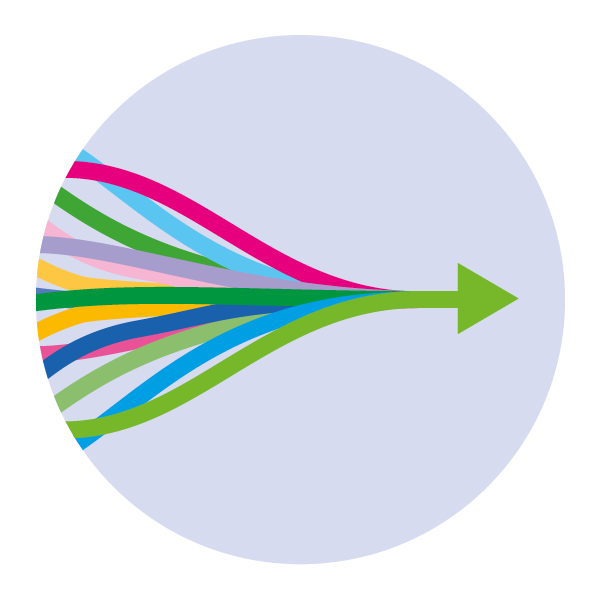This year marks the 10th anniversary of Genomics England. Following a decade of helping to drive scientific breakthroughs and whole genome diagnostics and personalised medicine, our research vision sets out how we will continue in our mission to bring the benefits of genomic healthcare to everyone.
A great place to start…
The 100,000 Genomes Project was launched in 2013 marking an important milestone for genomics in healthcare.
Sequencing for the project was completed in 2018, and since then we have worked closely with the NHS to sequence another 130,000 genomes. Both the National Genomic Research Library (NGRL) and the National Genomic Medicine Service have been built off the foundation of the project.
In 2022 alone, over 1,500 potential new diagnoses were returned to NHS clinical teams, thanks to research on data in the NGRL.
We keep patients and participants at the forefront of everything we do, and our goals at Genomics England are consistently shaped by the science, technology, and understanding of the field we work in. All of which have greatly advanced in the last 10 years.
In line with these advances, we are excited to share our Research vision. The vision highlights what we are doing to continue driving science and supporting researchers and clinicians in making new discoveries to bring answers to patients.
The vision in a snapshot
Our Research Vision brings together different strands of the work we do at Genomics England. It sets out new challenges and goals, whilst maintaining our core focus of enabling research from health and genomic data.
We will continue working to drive genomics-informed diagnosis and therapies, and rare conditions and cancer will stay at the heart of what we do.
The legacy of the 100,000 Genomes Project will remain an important factor in the goals we work towards, and the past decade has shown us the great potential of genomics to advance research and healthcare, bringing benefits to so many patients and participants.
What does the vision aim to do?
Our vision in research is to provide the benefits of genomic research to everyone, enabled by world-class user-friendly services.
By supporting the global use of genomic and health data, we can continue to inform science, diagnostics and therapies, innovative technologies, and clinical pathways.
There are 3 key components of our Research Vision:

1) Improving our core research performance
The NGRL, managed in partnership with the NHS, is a critical source of genomic and health data.
As genomic technologies become more accessible and improve in performance, even more opportunities arise for genomics to contribute across the range of human diseases.
To improve our core research performance, we will make the most of the connections we have with our impressive research community. We will do this by refreshing our community structure.
Working closely with the academic and clinical communities, we will create more ways for us to engage with those working on the data, for them to work with each other, and for stronger connections to be built to patient and participant groups.
We will improve the support we provide to those using our secure Research Environment, as well as improving the depth and quality of data that is made available for research. This will enable a broader range of research approaches, and should lead to more potentially clinically relevant findings for participants of the 100,00 Genomes Project and patients in the NHS Genomic Medicine Service.

2) Refreshing our governance
We continuously review and update our governance processes in a way that gives us appropriate oversight and control of research using data in the NGRL.
This way, we can ensure that researchers around the world are using the NGRL in line with our principles, to safely reach their goals and help us deliver on ours.
We can make sure that the work being done matches the consent and expectations of patients and participants, without adding unnecessary barriers that might delay useful research.
We are also committed to improving patient and public involvement (PPI) in research, for which we are building ‘condition portfolios’ in which charities, participants and researchers can be unified around specific disease areas.

3) Growing our impact
We believe that genomics will have the largest impact when it is used alongside other approaches.
By expanding our focus beyond WGS, for example to multimodal and multiomic approaches, we can grow the impact of our research and any research involving data from the NGRL.
We will increase our support for genomics research into new therapies, deepen our engagement with our life sciences industry partners, and will look to increase the number of international researchers with safe access to our secure Research Environment.
All of these will help the work we do and the research we enable to have the greatest possible impact.
On the right track
At Genomics England, we already have several programmes that are building the foundations for the future of genomics.
The launch of the Generation Study shows our dedication to diagnosis and early intervention of rare conditions, assessing how genomics can be used to provide answers to patients as early as possible.
Our efforts for a diverse and representative dataset show our commitment for genomic insights to be relevant for everyone, regardless of their background. Genomics should be a driving force for equality in healthcare.
Our Cancer 2.0 initiative is trialing new genomic approaches for cancer research and care. We are using advanced genomic technologies, in partnership with the NHS, to improve how genomics is used in cancer research, diagnosis, and precision cancer care.
Through these programmes we can build a robust foundation for the future of genomic healthcare.
All our work so far has been possible thanks to participants of the 100,000 Genomes Project. Our vision remains dedicated to doing the best we can for our participants, and our Participant Panel helps keep patient interest at the centre of what we do.
What does the future hold?
Recent scientific advances and the increasing capabilities of genomics point to an extremely promising future.
We forecast that by 2026, the number of participants who have volunteered their genomic and linked clinical data for research will have increased considerably. This will make the NGRL one of the world’s largest datasets for rare conditions and cancer, as well as being a valuable resource for common disease research.
Chief Scientific Officer at Genomics England, Professor Matt Brown, comments:
“Over the last decade, we’ve seen incredible technological and scientific advances across genomic research. This progress has given us a wealth of tools to study rare genetic conditions and cancer. We’re excited to work with our community and our partners to build the world’s largest dataset with comprehensive genomic profiling, to support the development of improved diagnosis and personalised treatment of patients and families affected by cancer and rare conditions.”
At Genomics England, we will maintain a strong focus on driving research on rare conditions and cancer, where we are best placed to deliver benefits to patients. Robust ethics and participant perspectives will guide us at every step along the way.
By working together, we can help create a future in which everyone benefits from genomics.


